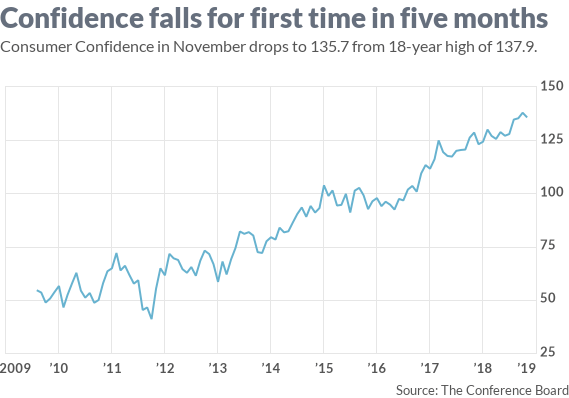Americans still upbeat, but they’re less optimistic about the future
The numbers: Consumers confidence fell in November for the first time in five months, reflecting a slightly less optimistic view among Americans on how the economy will perform next year.
The consumer confidence index slipped to 135.7 this month from an 18-year high of 137.9 in October, the Conference Board said Tuesday.

The present situation index, a measure of how Americans view the economy right now, edged up to 172.7 from 171.9. That’s just a shade below an 18-year peak.
A separate survey that asks consumers what the economy will look like six months from now dropped to 111.0 from 115.1. The October reading was the highest since 2000.
What happened: Americans are still very confident they can find a job with the unemployment rate at a 48-year low and job openings near a record high. They just aren’t sure their income will grow much faster in the next year.
Nor are they as sure business conditions will remain as strong as they’ve been for the most of the last two years.
“Despite a small decline in November, consumer confidence remains at historically strong levels,” said Lynn Franco, senior director of economic indicators at the board.
“Overall, consumers are still quite confident that economic growth will continue at a solid pace into early 2019,” she said. “However, if expectations soften further in the coming months, the pace of growth is likely to begin moderating.”
Big picture: The survey of consumer confidence shows Americans are still quite optimistic about the economy, if a bit less so than they were just a month or two ago.
One caveat: The survey doesn’t ask consumers about the stock market and how its performance affects them. Stocks have fallen sharply in the past month, bringing fresh worries mainly to upper-income Americans who have much of their retirement savings in the market.
A different consumer survey shows that lower-income Americans with less or no money in the stock market were more optimistic about the U.S. economy and their own financial well-being.
What they are saying?: “Various measures of consumer attitudes have slipped by a point or two in November, but the levels of the indices all remain sky-high,” said chief economist Stephen Stanley of Amherst Pierpont Securities. “Early reports on shopping over the past weekend underscore the view that consumers are buoyant and intend to spend liberally this Christmas season.”
Market reaction: The Dow Jones Industrial Average DJIA, +0.46% and the S&P 500 SPX, +0.15% fell in Tuesday trades, giving back most of Monday’s gains.
The 10-year Treasury yield TMUBMUSD10Y, +0.24% was little changed at 3.06%.
